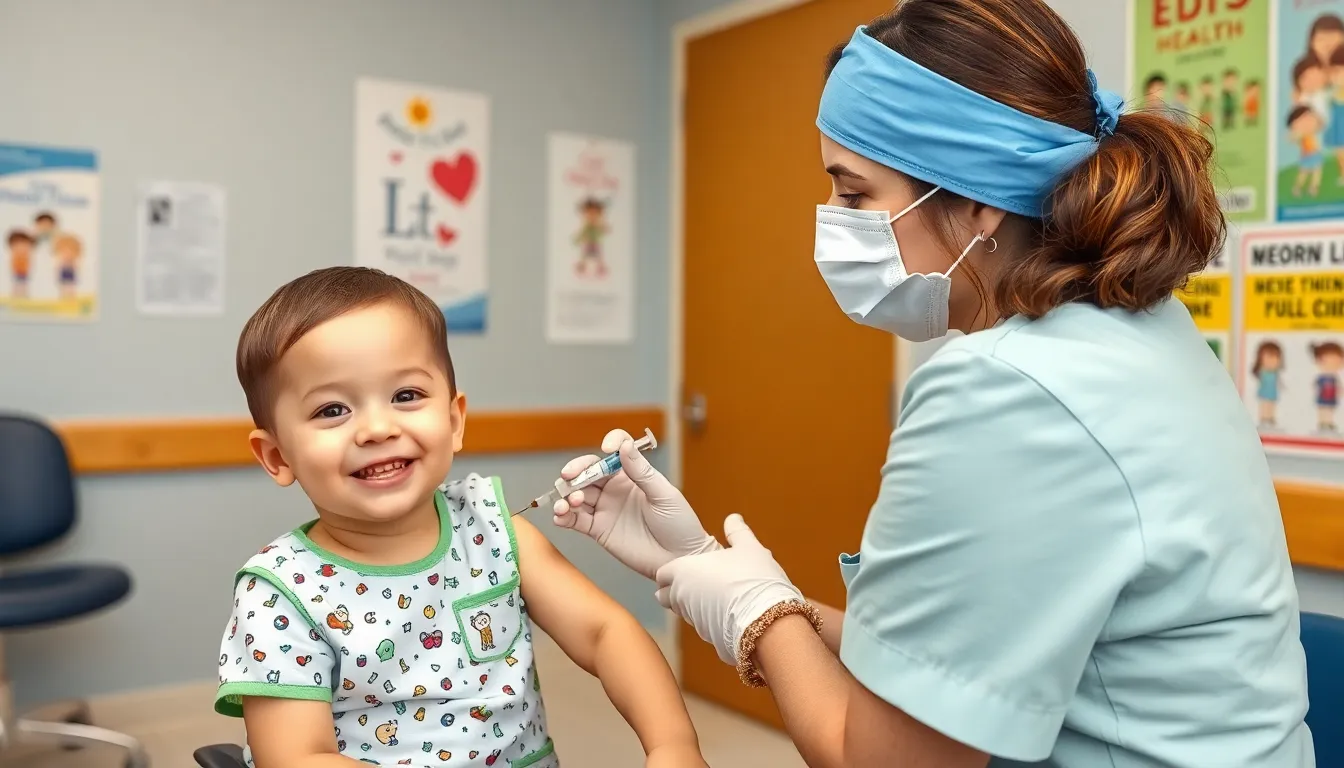When it comes to toddler immunization, parents often find themselves navigating a maze of information, opinions, and a sprinkle of anxiety. But fear not! Getting those tiny arms ready for their vaccines is not just a rite of passage; it’s a superhero move that protects your little one from nasty bugs lurking around.
Imagine your toddler as a tiny warrior, armed with a shield of immunity, ready to take on the world. With each shot, they gain superpowers against diseases that could otherwise put a damper on their adventures. So, while the thought of a quick jab might make them frown, the giggles and joy that follow are worth it. After all, a healthy toddler is a happy toddler, and who doesn’t want more of those adorable giggles? Let’s dive into the world of toddler immunization and discover how to keep those tiny warriors strong and thriving.
Table of Contents
ToggleImportance Of Toddler Immunization
Toddler immunization serves as a fundamental measure in safeguarding children’s health. Vaccines protect against severe illnesses such as measles, mumps, and rubella. Each vaccination builds immunity, allowing toddlers to thrive in various social environments.
The World Health Organization reports that immunized children experience lower rates of infection, significantly reducing the chances of outbreaks. Protecting one child also helps shield others through herd immunity. Parents can feel confident knowing that vaccines effectively prevent once-common diseases.
In addition to individual health benefits, vaccination supports community well-being. Communities with higher vaccination rates typically witness decreased cases of preventable diseases. It’s crucial to follow recommended immunization schedules, as timely vaccinations ensure the strongest possible defense against illnesses.
Healthcare professionals recommend discussing immunization plans with pediatricians. Understanding the specific vaccines recommended for toddlers helps caregivers make informed decisions. Engaging with healthcare providers allows parents to address any concerns related to immunization.
Research consistently shows that vaccines contribute to longer, healthier lives. Children who receive timely immunizations often experience fewer healthcare visits and lower medical costs in the long run. Ensuring toddlers stay up-to-date with vaccines leads to a safer environment for all children.
Common Vaccines For Toddlers

Immunization plays a key role in protecting toddlers from infectious diseases. Several vaccines form a crucial part of their healthcare.
Vaccine Schedule
The CDC recommends a specific vaccine schedule for toddlers. Vaccines are usually administered at 12–15 months, followed by additional doses at 4–6 years. Timely vaccinations, given according to this schedule, effectively strengthen defenses against various illnesses.
Vaccine Types
Key vaccines for toddlers include the measles, mumps, and rubella (MMR) vaccine, which safeguards against three infectious diseases. Another essential vaccine, the DTaP, protects against diphtheria, tetanus, and pertussis. The Hib vaccine targets Haemophilus influenzae type b, while the pneumococcal conjugate vaccine (PCV) defends against pneumonia. In addition, the hepatitis A and B vaccines provide critical protection. Vaccination against varicella, the virus that causes chickenpox, also occurs during this stage.
Benefits Of Immunization
Toddler immunization provides significant health advantages that support overall well-being. Vaccines act as a shield against harmful diseases, enabling children to grow healthy and free from preventable illnesses.
Preventing Diseases
Vaccination plays a crucial role in preventing diseases like measles, mumps, and rubella. By receiving recommended immunizations, toddlers gain protection from severe infections that can lead to serious complications. Immunized children enjoy less frequent hospital visits due to diseases that vaccines prevent. Additionally, early vaccinations lead to a lifetime of immunity, safeguarding children as they age. Parents benefit from peace of mind knowing that their toddlers are less susceptible to illnesses associated with missed vaccinations.
Herd Immunity
Herd immunity protects communities by creating a barrier against the spread of contagious diseases. When a significant portion of the population is immunized, both vaccinated and unvaccinated individuals experience reduced risk of contracting diseases. Vaccination rates above 95% are generally necessary to achieve effective herd immunity for highly contagious illnesses. This collective protection helps keep vulnerable individuals safe, including infants and those with compromised immune systems. As more children receive vaccines, communities experience lower rates of outbreaks, fostering a healthier environment for everyone.
Addressing Concerns About Vaccines
Parents often voice concerns about vaccines due to prevalent misconceptions. Clarifying these misconceptions helps parents understand the critical role vaccinations play in a toddler’s health. Many mistakenly believe that vaccines cause the diseases they prevent, but scientific evidence disproves this notion. Vaccines undergo rigorous testing to ensure safety and efficacy. Misinformation can lead to fear; discussing these myths with healthcare professionals can provide reassurance and accurate information.
Misconceptions About Vaccination
Numerous myths surround toddler vaccinations. One common misconception suggests that vaccines overload a child’s immune system. In reality, infants and toddlers encounter countless germs daily, and vaccines equip their immune systems to fight infections more effectively. Another belief claims that vaccine-preventable diseases are no longer a risk. However, outbreaks still occur in communities with low vaccination rates. Parents who understand the facts can make informed decisions that support their children’s health and well-being.
Side Effects And Reactions
Mild side effects often accompany vaccinations, including low-grade fever and soreness at the injection site. These reactions typically indicate that the immune system is responding to the vaccine, preparing to combat potential infections. Severe reactions are rare, occurring in approximately one in a million doses for most vaccines. Consulting a pediatrician can offer guidance on what to expect and ensures peace of mind. Understanding these responses helps parents navigate immunization schedules with confidence, ensuring toddlers receive critical protection against preventable diseases.
Toddler immunization is a vital aspect of a child’s health journey. By ensuring timely vaccinations, parents equip their little ones with the necessary defenses against serious diseases. The benefits extend beyond individual health to encompass community well-being through herd immunity.
Addressing concerns and misconceptions is essential in fostering confidence in vaccinations. With informed discussions with pediatricians, parents can navigate immunization schedules effectively. Ultimately, prioritizing immunization not only safeguards children but also contributes to a healthier future for everyone. Embracing this responsibility leads to a thriving and joyful childhood, free from preventable illnesses.



